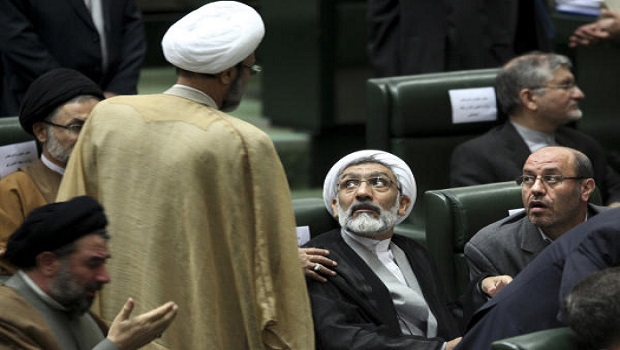
Mostafa Pourmohammadi, center, nominee for Iran’s justice minister, listens to an unidentified lawmaker as he attends a session of parliament to debate on President Hasan Rouhani’s proposed Cabinet in Tehran, Iran, Tuesday, Aug. 13, 2013. (AP Photo/Ebrahim Noroozi)
Mohammad Javad Zarif, the proposed name for foreign minister, Mohammad Ali Najafi, for minister of education, and Mustafa Pour-Mohammadi, for minister of justice, faced the strongest opposition during the hearings.
Critics of Zarif lambasted his westernized mindset and accused him of not having a clear agenda to push forward the Islamic Republic’s foreign policy in the region, in particular in relation to Syria, Lebanon and Palestine.
The radical wing, known as principalists, attacked Zarif’s friendly face towards American policymakers and branded him as a member of “New Yorker band”. This term has been used to discredit a number of Iranian moderates and US-educated diplomats who have served in Iran’s permanent mission to the UN.
MP Nasrollah Pejman Far described Zarif’s agenda as betting on running the foreign ministry free from any trace of revolutionary ideals and anti-hegemony substance, thus very lenient towards the West. “Zarif should feel threatened by the level support and applause he has been receiving from the westerners, in particular some American pundits who described him as the olive branch,” he said.
In his reply to the critics, Zarif referred to various approvals for his performance at the UN and other negotiations he participated on behalf of Supreme Leader Ayatollah Khamenei. Zarif reminded the MPs of Iran’s critical international standing and the urgency for a rational foreign policy in the pursuit of Iran’s national interest and security.
Zarif robustly defended his patriotism saying that since he was asked to leave his post at the UN, he returned to Iran and has not accepted prestigious academic positions he was repeatedly offered.
The majority of MPs, including moderate and traditional principalists, are backing Zarif’s bid for the post. This backing comes at a time when a consensus is being reached on the need for Iran’s foreign policy to take the lead to reduce the economic pressure that the country has been facing over the last 4 years.
Opponents of Najafi concentrated on his display of sympathy towards the families of wounded protesters in the aftermath of the disputed elections in 2009. Najafi defended his record by saying that to visit some families of wounded protesters was a duty to protect citizens, while at the same time ensuring they would not need to resort to foreign media to express their anger and frustrations.
Pour-Mohammadi’s name drew widespread criticism not only from some radical principalists, but also from president Rouhani’s reformist constituency. Pour-Mohammadi served as deputy intelligence minister during Hashemi Rafsanjani’s presidency, as well as interior minister during the first term of Ahmadinejad’s government. His tenure was terminated by Ahmadinejad, who forced him to resign. After leaving the government he was appointed as head of Iran’s General Inspection Office, linked to the country’s judiciary.
Pour-Mohammadi has the support of major conservative figures and his choice seems to be a conciliatory decision by president Rouhani to strengthen his government against conservative rebellion.
The justice minister in Iran has little power and acts as the link between the executive branch and the powerful judiciary which is completely independent from the government and its head is appointed by the supreme leader.
The final vote of confidence by the Iranian parliament for each of the proposed names is expected to happen on Thursday, although there is the chance that it will be postponed to Saturday. According to various Iranian news agencies, at least 16 out of the 18 proposed ministers will be approved. In the case some of the names are rejected by the parliamentary vote, the president has the power to appoint a caretaker for those posts for a period of 3 months.
